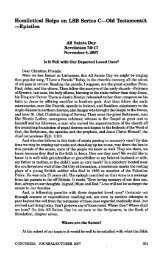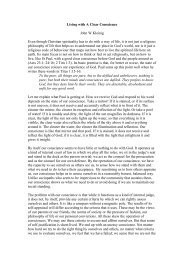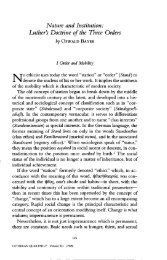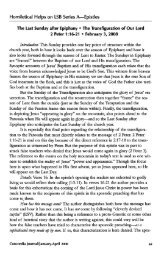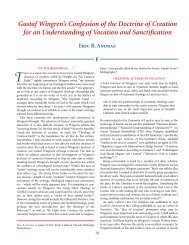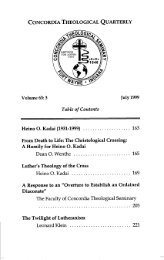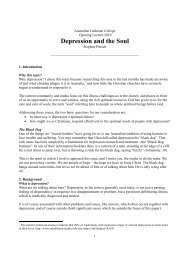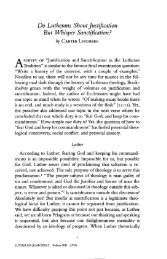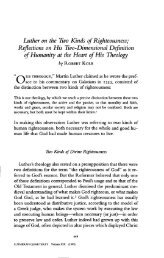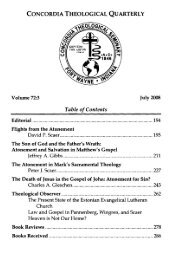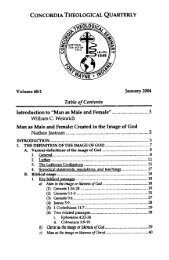Faith in the Old and New Testaments: Harmony or Disagreement?
Faith in the Old and New Testaments: Harmony or Disagreement?
Faith in the Old and New Testaments: Harmony or Disagreement?
You also want an ePaper? Increase the reach of your titles
YUMPU automatically turns print PDFs into web optimized ePapers that Google loves.
JANUARY 1983<strong>Faith</strong> <strong>in</strong> <strong>the</strong> <strong>Old</strong> <strong>and</strong> <strong>New</strong> <strong>Testaments</strong>:<strong>Harmony</strong> <strong>or</strong> <strong>Disagreement</strong>? ............ .... Seth Erl<strong>and</strong>sson 1The Concept of Anfechtung <strong>in</strong> Lu<strong>the</strong>r'sThought . . . . ........... .... .......... ... .. . ..... David P. Scaer 15Theological 0 bserver .. . . . . . . . . . . . . . . . . . . . . . . . . . . . . . . . . . . . . . . . . . , . . . . . . . . . . . . . . . 3 1Homiletical Studies ............................................................ 37Conc<strong>or</strong>dia Theological Quarterly:Indices to Volumes 4 1-46 (1977-1982)Auth<strong>or</strong> Index ......... . . .. . ...... .... . . . .. .. .... .. .... . . . .. . .. .. . . . . . . ... .... . . . 6 1Title Index .......................... 73Subject Index .. . . . .... .. .. .... .. .. ......... . . . .. .... .. . . .. .. . . . . . . .. .... ... . .. .. 79Scripture Index to Homiletical Studies ............................ 89
<strong>Faith</strong> <strong>in</strong> <strong>the</strong> <strong>Old</strong> <strong>and</strong> <strong>New</strong> <strong>Testaments</strong>:<strong>Harmony</strong> <strong>or</strong> <strong>Disagreement</strong>?Seth Erl<strong>and</strong>ssonMany people are ra<strong>the</strong>r unclear about <strong>the</strong> Biblical concept offaith. This lack of clarity especially perta<strong>in</strong>s to faith <strong>in</strong> <strong>the</strong> <strong>Old</strong>Testament, but it also <strong>in</strong>volves faith <strong>in</strong> <strong>the</strong> <strong>New</strong> Testament. Does"faith" really mean <strong>the</strong> same th<strong>in</strong>g <strong>in</strong> both testaments? Is not <strong>Old</strong>Testament religion ma<strong>in</strong>ly a religion of law <strong>in</strong> contrast to that of<strong>the</strong> <strong>New</strong> Testament? Are <strong>the</strong> object <strong>and</strong> content of faith <strong>the</strong> same<strong>in</strong> both testaments? If so, does <strong>the</strong> harmony consist <strong>in</strong> this, thatour justification <strong>in</strong> both testaments is based upon faith plusw<strong>or</strong>ks? Or does it consist <strong>in</strong> this, that our justification <strong>in</strong> bothtestaments is based solely on <strong>the</strong> L<strong>or</strong>d <strong>and</strong> accepted through faithalone? I th<strong>in</strong>k that <strong>the</strong> uncerta<strong>in</strong>ties about faith <strong>in</strong> <strong>the</strong> Bible aredue, first of all, to superficial ideas about <strong>the</strong> teach<strong>in</strong>gs of <strong>the</strong> <strong>Old</strong>Testament. Theref<strong>or</strong>e, faith <strong>in</strong> <strong>the</strong> <strong>Old</strong> Testament will attractmost of <strong>the</strong> attention <strong>in</strong> this study. In <strong>or</strong>der to clarify <strong>the</strong> nature<strong>and</strong> content of faith, it is natural to concentrate on two subjects:(1 .) <strong>the</strong> gospel (<strong>the</strong> object of faith <strong>in</strong> <strong>the</strong> two testaments) <strong>and</strong> (2.)<strong>the</strong> law <strong>and</strong> its role <strong>in</strong> <strong>the</strong> two testaments.I. The Gospel 9&1,13The gospel presupposes that man, without God's grace <strong>and</strong>mercy, is hopelessly lost. The Fall of man <strong>and</strong> its disasterous consequencesare <strong>the</strong> background f<strong>or</strong> <strong>the</strong> gospel <strong>in</strong> both <strong>the</strong> <strong>Old</strong> <strong>and</strong><strong>New</strong> <strong>Testaments</strong>. Because of its c<strong>or</strong>rupted nature, mank<strong>in</strong>dcannot produce <strong>the</strong> new man (that is, <strong>the</strong> righteousness <strong>and</strong>hol<strong>in</strong>ess) which God dem<strong>and</strong>s. Man is, <strong>the</strong>ref<strong>or</strong>e, w<strong>or</strong>thy of death<strong>and</strong> eternal damnation. The gospel <strong>in</strong> its proper sense is <strong>the</strong> good<strong>and</strong> joyful message that <strong>the</strong> L<strong>or</strong>d Himself takes 'care of <strong>the</strong>hopeless s<strong>in</strong>ner. To such s<strong>in</strong>ners God promises <strong>and</strong> gives mercy,f<strong>or</strong>giveness of s<strong>in</strong>s <strong>and</strong> eternal life "f<strong>or</strong> His own sake," f<strong>or</strong> man has<strong>in</strong> no way deserved God's grace <strong>and</strong> salvation. The F<strong>or</strong>mula ofConc<strong>or</strong>d gives this clear def<strong>in</strong>ition of <strong>the</strong> gospel (SD V:2 1):F<strong>or</strong> everyth<strong>in</strong>g which comf<strong>or</strong>ts <strong>and</strong> which offers <strong>the</strong> mercy<strong>and</strong> grace of God to <strong>the</strong> transgress<strong>or</strong>s of <strong>the</strong> law strictlyspeak<strong>in</strong>g is, <strong>and</strong> is called, <strong>the</strong> Gospel.'It ought to be superfluous here to prove that <strong>the</strong> backgroundf<strong>or</strong> <strong>the</strong> gospel, man's c<strong>or</strong>rupted human nature <strong>and</strong> <strong>in</strong>ability tokeep <strong>the</strong> law, is <strong>the</strong> same <strong>in</strong> <strong>the</strong> <strong>Old</strong> Testament <strong>and</strong> <strong>in</strong> <strong>the</strong> <strong>New</strong>Testament. But what about <strong>the</strong> gospel? Is <strong>the</strong> object of faith <strong>the</strong>same?
2 CONCORDIA THEOLOGICAL QUARTERLYA. HARMONYThe object of faith <strong>in</strong> both testaments is God's undeservedgoodness <strong>and</strong> mercy. Through His gracious acts <strong>and</strong> promises,God shows that He cares f<strong>or</strong> s<strong>in</strong>ful man. He promises s<strong>in</strong>ful manHis bless<strong>in</strong>g <strong>and</strong> salvation "f<strong>or</strong> His own sake," which means thatHe Himself is <strong>the</strong> only cause of this grace.A Sh<strong>or</strong>t SurveyA sh<strong>or</strong>t survey will confirm this conclusion. As soon as man hasrevolted aga<strong>in</strong>st God <strong>and</strong> brought about his own ru<strong>in</strong>, God showsthat He cares f<strong>or</strong> s<strong>in</strong>ful man. God does not wait f<strong>or</strong> man'simprovement bef<strong>or</strong>e He promises help <strong>and</strong> salvation. He alwaystakes <strong>the</strong> <strong>in</strong>itiative <strong>and</strong> offers to be <strong>the</strong> s<strong>in</strong>ner's God <strong>and</strong> to savehim. He helps Adam <strong>and</strong> Eve to realize <strong>the</strong>ir s<strong>in</strong> (Gen. 3: 14- 15).Man is given hope <strong>and</strong> new life through this promise. Then Godcont<strong>in</strong>ues to show His goodness toward man. He makes garmentsof sk<strong>in</strong> f<strong>or</strong> Adam <strong>and</strong> his wife <strong>and</strong> clo<strong>the</strong>s <strong>the</strong>m (Gen. 3:2 1). Even<strong>the</strong> bro<strong>the</strong>r-murderer Ca<strong>in</strong> receives a mark from God so that noone will kill him (Gen. 4:l). Eve praises God's grace when shegives birth to Ca<strong>in</strong> (Gen. 4: 1) <strong>and</strong> Seth (Gen. 4:25). And at thattime people start publicly to proclaim - call out <strong>and</strong> call on (<strong>in</strong>Hebrew qara') - <strong>the</strong> name of <strong>the</strong> L<strong>or</strong>d (Gen. 4:26). Notice that<strong>the</strong> basis f<strong>or</strong> true w<strong>or</strong>ship is God's bless<strong>in</strong>gs (see also Gen. 12:8).The believer knows that <strong>the</strong> reason f<strong>or</strong> God's mercy <strong>and</strong> man's life<strong>and</strong> salvation is only "<strong>the</strong> name of <strong>the</strong> L<strong>or</strong>d." To believe (<strong>in</strong>Hebrew <strong>the</strong> hiphil of 'mn) means to say "amen" to God <strong>and</strong> Hispromises, to trust Him <strong>and</strong> His w<strong>or</strong>ds.When we reach Abraham's time, about two thous<strong>and</strong> yearsbef<strong>or</strong>e Christ, God makes His promise about <strong>the</strong> woman's seedm<strong>or</strong>e <strong>and</strong> m<strong>or</strong>e specific, first to Abraham <strong>and</strong> his offspr<strong>in</strong>g: "Allpeoples on earth will be blessed through you" (Gen. 12:3);"Through your seed all nations on earth will be blessed" (Gen.22:18). Of Abraham's children, <strong>the</strong> promise is given specifically toIsaac (Gen. 26:4,24); of Isaac's children, to Jacob (Gen. 28: 14); ofJacob's children, to Judah (Gen. 49:8-12); of Judah's manydescendents, to Jesse (Is. 11:l); <strong>and</strong> of his children, to David (2Sam. 7). And when <strong>the</strong> time had fully come <strong>and</strong> God <strong>the</strong> Fa<strong>the</strong>rsends His beloved Son, <strong>the</strong> promised Savi<strong>or</strong>, He is b<strong>or</strong>n, <strong>in</strong>acc<strong>or</strong>dance with <strong>the</strong> promise <strong>in</strong> Micah 5:2, <strong>in</strong> Bethlehem, <strong>the</strong>town of David. So <strong>the</strong> <strong>New</strong> Testament is c<strong>or</strong>rect when itemphasizes that Jesus Christ is <strong>the</strong> fulfilment of <strong>the</strong> oath-boundpromise to Abraham <strong>in</strong> Genesis 22 (Luke 1:73; Gal. 3:16), <strong>the</strong>promise to David (Luke 1 :32,69), <strong>the</strong> promises through <strong>the</strong> prophets(Luke 1 ;70). The basis f<strong>or</strong> <strong>the</strong> promise of life <strong>and</strong> vict<strong>or</strong>y,
<strong>Faith</strong> <strong>in</strong> <strong>the</strong> <strong>Testaments</strong> 3salvation <strong>and</strong> bless<strong>in</strong>g, which was given to <strong>the</strong> fa<strong>the</strong>rs s<strong>in</strong>ce <strong>the</strong>day of <strong>the</strong> fall, was all <strong>the</strong> time <strong>the</strong> promised seed, <strong>the</strong> Son of Man,<strong>the</strong> Savi<strong>or</strong>. He is <strong>the</strong> only salvation, peace, comf<strong>or</strong>t,righteousness, <strong>and</strong> light f<strong>or</strong> every man s<strong>in</strong>ce <strong>the</strong> day of <strong>the</strong> fall till<strong>the</strong> last day. He Himself says that Moses wrote about Him (John5:46). Not only is He <strong>the</strong> decisive content of <strong>the</strong> gift of God, <strong>the</strong>gospel; He is also <strong>the</strong> content of <strong>the</strong> dem<strong>and</strong> of God. He is <strong>the</strong> newMan who loves <strong>the</strong> Fa<strong>the</strong>r <strong>and</strong> His fellowman perfectly. He says,"Here I am, I have come - it is written about Me <strong>in</strong> <strong>the</strong> scroll"(Ps. 40:7).What Is Meant by <strong>Faith</strong>?It is impossible to speak about faith <strong>in</strong> <strong>the</strong> right way if one doesnot speak of <strong>and</strong> <strong>in</strong>clude <strong>the</strong> object of faith, namely, <strong>the</strong> promisesof grace <strong>and</strong> mercy. Lu<strong>the</strong>r expla<strong>in</strong>s <strong>the</strong> nature of faith when hecomments on <strong>the</strong> bless<strong>in</strong>gs through Abraham's seed:It is <strong>the</strong> nature of faith to believe with certa<strong>in</strong>ty that we areblessed, not through ourselves but through Christ, who isour bless<strong>in</strong>g. Hence we bless ourselves <strong>and</strong> ma<strong>in</strong>ta<strong>in</strong> that weare <strong>the</strong> ones to whom that bless<strong>in</strong>g belongs, f<strong>or</strong> it is faithwhich apprehends <strong>the</strong> bless<strong>in</strong>g.2To believe <strong>the</strong>se most gl<strong>or</strong>ious promises <strong>and</strong> to expect<strong>the</strong>se bless<strong>in</strong>gs from God with firm confidence is true faith?Acc<strong>or</strong>d<strong>in</strong>gly, let us streng<strong>the</strong>n <strong>and</strong> f<strong>or</strong>tify ourselvesaga<strong>in</strong>st <strong>the</strong> doubts of <strong>the</strong> papists, <strong>and</strong> let us learn that f<strong>or</strong>God <strong>the</strong> only completely pleas<strong>in</strong>g w<strong>or</strong>ship <strong>and</strong> obedience isfaith, that is, to believe <strong>and</strong> trust our God.4In <strong>the</strong> Apology of <strong>the</strong> Augsburg Confession we get <strong>the</strong>follow<strong>in</strong>g def<strong>in</strong>ition of true faith:The faith that justifies, however, is no mere hist<strong>or</strong>icalknowledge, but <strong>the</strong> firm acceptance of God's offer promis<strong>in</strong>gf<strong>or</strong>giveness of s<strong>in</strong>s <strong>and</strong> justification [IV: 481.<strong>Faith</strong> is that w<strong>or</strong>ship which receives God's offeredbless<strong>in</strong>gs . . . It is by faith that God wants to be w<strong>or</strong>shiped,namely, that we receive from him what he promises <strong>and</strong>offers [IV: 491.He [Paul] says that only faith can accept <strong>the</strong> promise. He<strong>the</strong>ref<strong>or</strong>e c<strong>or</strong>relates <strong>and</strong> connects promise <strong>and</strong> faith [IV: 501.And so at every mention of mercy we must remember thatthis requires faith, which accepts <strong>the</strong> promise of mercy.Similarly, at every mention of faith we are also th<strong>in</strong>k<strong>in</strong>g of itsobject, <strong>the</strong> promised mercy. F<strong>or</strong> faith does not justify <strong>or</strong> savebecause it is a good w<strong>or</strong>k <strong>in</strong> itself, but only because it accepts<strong>the</strong> promised mercy. This service <strong>and</strong> w<strong>or</strong>ship is especially
4 CONCORDIA THEOLOGICAL QUAKTEKI.,Ypraised throughout <strong>the</strong> prophets <strong>and</strong> <strong>the</strong> Psalms. Eventhough <strong>the</strong> law does not teach <strong>the</strong> free f<strong>or</strong>giveness of s<strong>in</strong>s, <strong>the</strong>patriarchs knew <strong>the</strong> promise of Christ, that f<strong>or</strong> his sake God<strong>in</strong>tended to f<strong>or</strong>give s<strong>in</strong>s [IV: 55-57].This is how God wants to be known <strong>and</strong> w<strong>or</strong>shiped, thatwe accept his bless<strong>in</strong>gs <strong>and</strong> receive t hem because of his mercyra<strong>the</strong>r than because of our own merits [IV: 601That this def<strong>in</strong>ition of faith <strong>in</strong> <strong>the</strong> Apology is true not onlyregard<strong>in</strong>g <strong>the</strong> <strong>New</strong> Testament can be shown by a few examplesfrom <strong>the</strong> <strong>Old</strong> Testament. Already a look at book one of <strong>the</strong>Psalms (Ps. 1-41) will conv<strong>in</strong>ce us:From <strong>the</strong> L<strong>or</strong>d comes deliverance [3:8].Turn, 0 L<strong>or</strong>d, <strong>and</strong> deliver me; save me because of yourunfail<strong>in</strong>g love [6:4].I trust <strong>in</strong> your unfail<strong>in</strong>g love; my heart rejoices <strong>in</strong> yoursalvation. I will s<strong>in</strong>g to <strong>the</strong> L<strong>or</strong>d, f<strong>or</strong> he has been good to me[13:5-61.The L<strong>or</strong>d lives! Praise be to my Rock! Exalted be God mySavi<strong>or</strong>! [18:46].0 L<strong>or</strong>d, my Rock <strong>and</strong> my Redeemer [lY:14].The L<strong>or</strong>d is my shepherd, I shall lack noth<strong>in</strong>g [23:1].Guide me <strong>in</strong> your truth <strong>and</strong> teach me, far you are God mySavi<strong>or</strong>, <strong>and</strong> my hope is <strong>in</strong> you all day long. Remember, 0L<strong>or</strong>d, your great mercy <strong>and</strong> love, f<strong>or</strong> <strong>the</strong>y are from of old[25:5-61.F<strong>or</strong> <strong>the</strong> sake of your name, 0 L<strong>or</strong>d, f<strong>or</strong>give my <strong>in</strong>iquity,though it is great [25:11].The L<strong>or</strong>d is my light <strong>and</strong> my salvation -whomshall I fear?The L<strong>or</strong>d is <strong>the</strong> stronghold of my life - of whom shall 1 beafraid [27: I].?F<strong>or</strong> his anger lasts only a moment, but his fav<strong>or</strong> lasts alifetime [30:5].Be my rock of refuge, a strong f<strong>or</strong>tress to save me. S<strong>in</strong>ce youare my rock <strong>and</strong> my f<strong>or</strong>tress, f<strong>or</strong> <strong>the</strong> sake of your name lead<strong>and</strong> guide me [3 1 :2-31.Into your h<strong>and</strong>s I commit my spirit; redeem me, 0 L<strong>or</strong>d, <strong>the</strong>God of truth [3 1 : 51.Blessed is he whose transgressions are f<strong>or</strong>given, whose s<strong>in</strong>sare covered [32: 11.I said, "I will confess my transgressions to <strong>the</strong> L<strong>or</strong>d" - <strong>and</strong>you f<strong>or</strong>gave <strong>the</strong> guilt of my s<strong>in</strong> [32:5].We wait <strong>in</strong> hope f<strong>or</strong><strong>the</strong> L<strong>or</strong>d; he is our help <strong>and</strong> our shield. Inhim our hearts rejoice, f<strong>or</strong> we trust <strong>in</strong> hii holy name p3:20-211.
<strong>Faith</strong> <strong>in</strong> <strong>the</strong> <strong>Testaments</strong> 5The L<strong>or</strong>d redeems his servants; no one who takes refuge <strong>in</strong>him will be condemned [34:22].Say to my soul, "I am your salvation" [35:3].Your love, 0 L<strong>or</strong>d, reaches to <strong>the</strong> heavens, your faithfulnessto <strong>the</strong> skies [36:5].Come quickly to help me, 0 L<strong>or</strong>d my Savi<strong>or</strong> [38:22].Is it possible to describe <strong>the</strong> object of faith <strong>and</strong> salvation by gracealone <strong>in</strong> a better way?If space permitted, we could see <strong>in</strong> <strong>the</strong> <strong>Old</strong> Testament prophetshow <strong>the</strong> dem<strong>and</strong>s of <strong>the</strong> law <strong>and</strong> <strong>the</strong> promises of <strong>the</strong> gospel arepresented side by side. F<strong>or</strong> example, after Isaiah presents <strong>the</strong> law'sdem<strong>and</strong> f<strong>or</strong> a new <strong>and</strong> clean man <strong>in</strong> 1:16-17, he adds <strong>the</strong>absolution of <strong>the</strong> gospel: "Though your s<strong>in</strong>s are like scarlet, <strong>the</strong>yshall be as white as snow" (v 18). Only he who believes <strong>the</strong> promiseof <strong>the</strong> gospel gets a new heart which wants to fulfil <strong>the</strong> dem<strong>and</strong>s of<strong>the</strong> law. The w<strong>or</strong>ds "wash <strong>and</strong> make yourselves clean, stop do<strong>in</strong>gwrong" denounce ungodly hearts <strong>and</strong> require faith, which only<strong>the</strong> gospel can create. The gospel sh<strong>in</strong>es clearly <strong>in</strong> <strong>the</strong> prophets aswell as <strong>in</strong> <strong>the</strong> Psalms. A few m<strong>or</strong>e examples would be appropriate:I, even I, am he who blots out your transgressions, f<strong>or</strong> myown sake, <strong>and</strong> remembers your s<strong>in</strong>s no m<strong>or</strong>e [Is. 43:25].I have swept away your offenses like a cloud, your s<strong>in</strong>s like<strong>the</strong> m<strong>or</strong>n<strong>in</strong>g mist. Return to me, f<strong>or</strong> I have redeemed you [Is.44:22]."The days are com<strong>in</strong>g," declares <strong>the</strong> L<strong>or</strong>d, "when I will raiseup to David a righteous Branch, a K<strong>in</strong>g who will reign wisely<strong>and</strong> do what is just <strong>and</strong> right <strong>in</strong> <strong>the</strong> l<strong>and</strong>. In his days Judahwill be saved <strong>and</strong> Israel will live <strong>in</strong> safety. This is <strong>the</strong> name bywhich he will be called: The L<strong>or</strong>d Our Righteousnessw [Jer.235-61.B. DISAGREEMENTThe Outward F<strong>or</strong>m of <strong>the</strong> GospelThere is no real disagreement between <strong>the</strong> <strong>Old</strong> <strong>and</strong> <strong>New</strong><strong>Testaments</strong>, only slight differences regard<strong>in</strong>g <strong>the</strong> outward f<strong>or</strong>m of<strong>the</strong> gospel. F<strong>or</strong> obvious reasons <strong>the</strong> promised salvation <strong>and</strong> <strong>the</strong>Savi<strong>or</strong> appear <strong>in</strong> m<strong>or</strong>e detail when <strong>the</strong> fulfilment of <strong>the</strong> promisetakes place. Let us use <strong>the</strong> language of Paul <strong>in</strong> Colossians 2: 17about <strong>the</strong> shadow oft h<strong>in</strong>gs that were to come, <strong>and</strong> Christ <strong>and</strong> Hisw<strong>or</strong>k as <strong>the</strong> reality beh<strong>in</strong>d this shadow. It is natural that <strong>the</strong>proper <strong>in</strong>terpretation of <strong>the</strong> shadow <strong>in</strong> <strong>the</strong> <strong>Old</strong> Testament may befound <strong>in</strong> <strong>the</strong> reality itself, <strong>the</strong> <strong>New</strong> Testament fulfilment; f<strong>or</strong> <strong>the</strong>shadow emanates from <strong>the</strong> reality. We can also use <strong>the</strong> picture <strong>in</strong>Isaiah 30:26 <strong>and</strong> apply it to <strong>the</strong> greater clarity of <strong>the</strong> <strong>New</strong>
6 CONCORDIA THEOLOGICAL QUARTERLYTestament: "The moon will sh<strong>in</strong>e like <strong>the</strong> sun, <strong>and</strong> <strong>the</strong> sunlightwill be seven times brighter, like <strong>the</strong> light of seven full days, when<strong>the</strong> L<strong>or</strong>d b<strong>in</strong>ds up <strong>the</strong> bruises of His people <strong>and</strong> heals <strong>the</strong> woundsHe <strong>in</strong>flicted." The Christian church <strong>the</strong>ref<strong>or</strong>e is not ashamed of<strong>in</strong>terpret<strong>in</strong>g t he shadows <strong>in</strong> <strong>the</strong> <strong>Old</strong> Testament from t he fulfilment<strong>in</strong> Christ. When, f<strong>or</strong> example, <strong>the</strong> promises <strong>in</strong> <strong>the</strong> <strong>Old</strong> Testamentdo not mention <strong>the</strong> merit<strong>or</strong>ious cause of God's mercy <strong>and</strong> <strong>the</strong>f<strong>or</strong>giveness of s<strong>in</strong>s <strong>or</strong> else use <strong>the</strong> w<strong>or</strong>ds "f<strong>or</strong> his own sake" <strong>or</strong> "f<strong>or</strong><strong>the</strong> sake of his name," it is possible f<strong>or</strong> <strong>the</strong> Christian church tostate m<strong>or</strong>e precisely "f<strong>or</strong> Christ's sake." In <strong>the</strong> Apology we havemany examples of this specify<strong>in</strong>g <strong>in</strong>terpretation of <strong>the</strong> <strong>Old</strong>Testament. But <strong>the</strong> merit<strong>or</strong>ious cause is mentioned also <strong>in</strong> <strong>the</strong> <strong>Old</strong>Testament, even <strong>in</strong> detail, as <strong>in</strong> Isaiah 53. And <strong>the</strong> sacrifices ofunblemished animals, which vicariously had to die f<strong>or</strong> humans<strong>in</strong>s, are a very clear shadow of Christ's satisfactio vicaria.The Pict<strong>or</strong>ial Language of <strong>the</strong> <strong>Old</strong> TestamentRegard<strong>in</strong>g differences, we ought also mention that <strong>the</strong> gospel <strong>in</strong><strong>the</strong> <strong>Old</strong> Testament is often clo<strong>the</strong>d <strong>in</strong> pict<strong>or</strong>ial language, whichrefers to <strong>the</strong> unique conditions of <strong>the</strong> <strong>Old</strong> Testament <strong>the</strong>ocracy -<strong>the</strong> connection of <strong>the</strong> <strong>Old</strong> Testament church with acerta<strong>in</strong> l<strong>and</strong>, acerta<strong>in</strong> nation, a certa<strong>in</strong> city, a certa<strong>in</strong> mounta<strong>in</strong>, a certa<strong>in</strong> priestlytribe, etc. In <strong>or</strong>der to picture <strong>the</strong> realities of <strong>the</strong> spiritual bless<strong>in</strong>gsof <strong>the</strong> <strong>New</strong> Testament <strong>the</strong> <strong>Old</strong> Testament prophets use <strong>the</strong>physical realities of <strong>the</strong> <strong>Old</strong> Testament church. Aga<strong>in</strong>st <strong>the</strong> backgroundof ru<strong>in</strong>ed cities, war <strong>and</strong> desolation, dep<strong>or</strong>tation, badroads, droughts <strong>and</strong> deserts, a destroyed temple, dangerous lions<strong>and</strong> vipers, <strong>the</strong> spiritual bless<strong>in</strong>gs of <strong>the</strong> <strong>New</strong> Testament salvationmight be pictured as reconstructed cities, a return to <strong>the</strong> promisedl<strong>and</strong>, an absence of wars <strong>and</strong> rough ground, streams <strong>in</strong> <strong>the</strong> desert,a new temple, peaceful lions <strong>and</strong> vipers.The differences between <strong>the</strong> <strong>Old</strong> <strong>and</strong> <strong>the</strong> <strong>New</strong> Testament havenoth<strong>in</strong>g to do with <strong>the</strong> real content of <strong>the</strong> gospel. It is <strong>the</strong> samegospel <strong>and</strong> <strong>the</strong> same way of salvation <strong>in</strong> both testaments. Thedifferences refer only to <strong>the</strong> outward f<strong>or</strong>m of <strong>the</strong> gospel.11. THE LAWIf many people are unclear about <strong>the</strong> gospel <strong>in</strong> <strong>the</strong> <strong>Old</strong> <strong>and</strong> <strong>New</strong><strong>Testaments</strong>, <strong>the</strong>ir confusion about <strong>the</strong> law <strong>in</strong> <strong>the</strong> two testaments iseven greater. Often <strong>the</strong>y f<strong>in</strong>d similarities where <strong>the</strong>re are realdifferences, <strong>and</strong> differences when none actually exist. F<strong>or</strong><strong>in</strong>stance, some dem<strong>and</strong> that <strong>the</strong> <strong>New</strong> Testament church obeymany of <strong>the</strong> regulations of <strong>the</strong> <strong>Old</strong> Testament <strong>the</strong>ocracy, eventhough <strong>the</strong>se have been fulfilled <strong>and</strong> are not <strong>in</strong>tended f<strong>or</strong> <strong>the</strong> <strong>New</strong>
<strong>Faith</strong> <strong>in</strong> <strong>the</strong> <strong>Testaments</strong> 7Testament church. And at <strong>the</strong> same time people are unclear about<strong>the</strong> real harmony.A. HARMONYNei<strong>the</strong>r <strong>in</strong> <strong>the</strong> <strong>Old</strong> n<strong>or</strong> <strong>the</strong> <strong>New</strong> Testament is <strong>the</strong> law <strong>in</strong>tended tocreate a new man, a believer, out of a s<strong>in</strong>ner. The law displayswhat <strong>the</strong> new man looks like <strong>and</strong> acc<strong>or</strong>d<strong>in</strong>gly denounces every manafter <strong>the</strong> fall f<strong>or</strong> not meet<strong>in</strong>g its st<strong>and</strong>ard of trust <strong>and</strong> love. The lawcannot create what it dem<strong>and</strong>s. It does not give life. It kills <strong>and</strong>creates despair. Only <strong>the</strong> gospel can give what <strong>the</strong> law dem<strong>and</strong>s . . .<strong>and</strong> <strong>the</strong> gospel offers it freely.It is imp<strong>or</strong>tant to dist<strong>in</strong>guish between keep<strong>in</strong>g <strong>the</strong> law <strong>in</strong> <strong>or</strong>derto obta<strong>in</strong> a gracious God <strong>and</strong> keep<strong>in</strong>g <strong>the</strong> law because, through<strong>the</strong> gospel, we havea gracious God. When Jesus says, "If you holdto my teach<strong>in</strong>g, you are really my disciples" (John 8:31), it doesnot mean that we earn God's grace <strong>and</strong> discipleship by hold<strong>in</strong>g toGod's teach<strong>in</strong>g. It means that what we have already, God's grace<strong>and</strong> our discipleship by grace alone, is thrown away when we nolonger trust God <strong>and</strong> His W<strong>or</strong>d <strong>and</strong> do not wish to ad acc<strong>or</strong>d<strong>in</strong>gto His will. The recipient of. God's grace wants <strong>in</strong> thankfulness tostay close to all that God says. Without belief <strong>in</strong> <strong>the</strong> gospel no onecan hold to God's teach<strong>in</strong>g. Theref<strong>or</strong>e, grace comes first <strong>and</strong> <strong>the</strong>keep<strong>in</strong>g of <strong>the</strong> law afterwards, <strong>and</strong> so it is <strong>in</strong> both <strong>the</strong> <strong>Old</strong> <strong>and</strong> <strong>New</strong><strong>Testaments</strong>.God did not give His comm<strong>and</strong>ments at S<strong>in</strong>ai to f<strong>in</strong>d outwhe<strong>the</strong>r Israel was good enough to earn His salvation. First Hesaved <strong>the</strong>m <strong>and</strong> gave <strong>the</strong>m His grace <strong>and</strong> undeserved mercy onlybecause of <strong>the</strong> promises to Abraham, Isaac, <strong>and</strong> Jacob. Then Hegave His comm<strong>and</strong>ments to saved people who needed to know <strong>the</strong>will of God <strong>and</strong> <strong>the</strong>ir duties as God's people, laws <strong>and</strong> dutieswhich only a people grateful f<strong>or</strong> God's salvation would wantto obey <strong>and</strong> <strong>the</strong>reby to confess its thankfulness <strong>and</strong> faith. Thebelievers did not obey God's comm<strong>and</strong>ments <strong>in</strong> <strong>or</strong>der to earngrace <strong>and</strong> salvation, but because <strong>the</strong>y had grace <strong>and</strong> redemption.They wanted to rema<strong>in</strong> <strong>in</strong> fellowship with <strong>the</strong>ir gracious God <strong>and</strong>not to depart from Him <strong>and</strong> His grace.If we study <strong>the</strong> role of law from <strong>the</strong> first page <strong>in</strong> <strong>the</strong> Bible on, wewill f<strong>in</strong>d that God's great goodness <strong>and</strong> fellowship with Him comefirst, His comm<strong>and</strong>ments afterwards. Already bef<strong>or</strong>e <strong>the</strong> fall Goddid not deliver His comm<strong>and</strong>ment (Gen. 2: 16-17) <strong>in</strong> <strong>or</strong>der to giveAdam a possibility to ga<strong>in</strong> fellowship with Him. Adam alreadyhad fellowship with God as a gracious gift. Through obedience to<strong>the</strong> comm<strong>and</strong>ment Adam would demonstrate his happ<strong>in</strong>ess f<strong>or</strong>
8 CONCORDIA THEOLOGICAL QUARTERLYthis fellowship, his faith <strong>in</strong> such a good <strong>and</strong> gracious God, <strong>and</strong> histrust <strong>in</strong> all that God said to him <strong>and</strong> did f<strong>or</strong> him. And after <strong>the</strong> fallGod always takes <strong>the</strong> <strong>in</strong>itiative <strong>and</strong> creates faith <strong>and</strong> offersfellowship through His w<strong>or</strong>d of promise <strong>and</strong> by grace alone. Thebasis f<strong>or</strong> grace <strong>and</strong> f<strong>or</strong>giveness is never <strong>the</strong> obedience of man. But<strong>the</strong> obedience of man is a consequence <strong>and</strong> a testimony of his faith<strong>in</strong> God's grace <strong>and</strong> mercy.The Exh<strong>or</strong>tation to Do Good W<strong>or</strong>ksBoth <strong>the</strong> <strong>Old</strong> <strong>and</strong> <strong>New</strong> <strong>Testaments</strong> exh<strong>or</strong>t man to do deeds oflove. The apostle says <strong>in</strong> 1 C<strong>or</strong><strong>in</strong>thians 13:2 t hat he is noth<strong>in</strong>g if hehas not love. This is often misunderstood, as if Scripture taughtthat we will be justified through our love <strong>and</strong> good w<strong>or</strong>ks. TheApology refutes this misunderst<strong>and</strong><strong>in</strong>g <strong>in</strong> a clear way:In this text Paul is not discuss<strong>in</strong>g <strong>the</strong> mode of justification.He is writ<strong>in</strong>g to people who, upon be<strong>in</strong>g justified, neededurg<strong>in</strong>g to bear good fruits lest <strong>the</strong>y lose <strong>the</strong> Holy Spirit [IV:2201.No one can draw anyth<strong>in</strong>g m<strong>or</strong>e from this text than that loveis necessary. This we grant. It is also necessary not to steal. Itwould be a fallacy to reason that because it is necessary not tosteal, <strong>the</strong>ref<strong>or</strong>e not steal<strong>in</strong>g justifies [IV: 2221.Melanchthon's last po<strong>in</strong>t can be applied to <strong>the</strong>ologians <strong>in</strong> ourtime who ma<strong>in</strong>ta<strong>in</strong> that <strong>the</strong> gospel frees <strong>the</strong>m from <strong>the</strong> necessity ofreject<strong>in</strong>g higher criticism <strong>and</strong> false prophets. We also have tost<strong>and</strong> up f<strong>or</strong> <strong>the</strong> doctr<strong>in</strong>e of justification through faith alone, <strong>the</strong>gospel of both <strong>the</strong> <strong>Old</strong> <strong>and</strong> <strong>New</strong> <strong>Testaments</strong>. But to avoid highercriticism, false prophets, unionism, <strong>and</strong> steal<strong>in</strong>g is necessary, not<strong>in</strong> <strong>or</strong>der to become justified, but because <strong>the</strong> one who has received<strong>the</strong> gift of justification is anxious to rema<strong>in</strong> <strong>in</strong> God's W<strong>or</strong>d <strong>and</strong>not to leave <strong>the</strong> L<strong>or</strong>d.God's Deal<strong>in</strong>g with IsraelGod's deal<strong>in</strong>g with Israel <strong>and</strong> His election of this people to aspecific task <strong>in</strong> hist<strong>or</strong>y dur<strong>in</strong>g <strong>the</strong> <strong>Old</strong> Testament era clearlydemonstrate God's grace <strong>and</strong> that <strong>the</strong> law did not abolish <strong>the</strong>gospel. This is emphasized <strong>in</strong> Romans <strong>and</strong> Galatians. But Moseshad already written:The L<strong>or</strong>d did not set his affection on you <strong>and</strong> choose youbecause you were m<strong>or</strong>e numerous than o<strong>the</strong>r peoples . . . itwas because <strong>the</strong> L<strong>or</strong>d loved you <strong>and</strong> kept <strong>the</strong> oath he sw<strong>or</strong>eto your f<strong>or</strong>efat hers [Deut. 7:7-81.It is not because of your righteousness <strong>or</strong> your <strong>in</strong>tkgrity thatyou are go<strong>in</strong>g <strong>in</strong> to take possession of <strong>the</strong>ir l<strong>and</strong>; but on
<strong>Faith</strong> <strong>in</strong> <strong>the</strong> <strong>Testaments</strong> 9account of <strong>the</strong> wickedness of <strong>the</strong>se nations, <strong>the</strong> L<strong>or</strong>d yourGod will drive <strong>the</strong>m out bef<strong>or</strong>e you, to accomplish what hesw<strong>or</strong>e to your fa<strong>the</strong>rs, to Abraham, Isaac, <strong>and</strong> Jacob.Underst<strong>and</strong>, <strong>the</strong>n, that it is not because of your righteousnessthat ,<strong>the</strong> L<strong>or</strong>d your God is giv<strong>in</strong>g you this good l<strong>and</strong> topossess, f<strong>or</strong> you are a stiff-necked people [Deut. 95-61.Daniel prayed: "We do not make requests of you because weare righteous, but because of your great mercy. 0 L<strong>or</strong>d, listen! 0L<strong>or</strong>d, f<strong>or</strong>give! 0 L<strong>or</strong>d, hear <strong>and</strong> act! F<strong>or</strong> your sake, 0 my God, donot delay, because your city <strong>and</strong> your people bear your name*(Dan. 9: 18- 19).B. DISAGREEMENTThe Outward Regulations <strong>in</strong> <strong>the</strong> <strong>Old</strong> TestamentJust as <strong>the</strong> gospel <strong>in</strong> <strong>the</strong> <strong>Old</strong> Testament often has an outwardf<strong>or</strong>m due to <strong>the</strong> special conditions of <strong>the</strong> <strong>Old</strong> Testament<strong>the</strong>ocracy, so also <strong>the</strong> law with its dem<strong>and</strong>s of love to God <strong>and</strong> ourneighb<strong>or</strong> is connected with many outward regulations due to <strong>the</strong>fact that Israel as a visible nation had a special task dur<strong>in</strong>g <strong>Old</strong>Testament times. It was not that Israel would obta<strong>in</strong> righteousnessbef<strong>or</strong>e God by observ<strong>in</strong>g all <strong>the</strong>se regulations, however. Godhad already given His grace <strong>and</strong> fellowship to Israel, <strong>and</strong> He hadf<strong>or</strong> His own sake given her both spiritual <strong>and</strong> physical promises.As God's redeemed people <strong>the</strong> Israelites ought to have shown<strong>the</strong>ir thankfulness f<strong>or</strong> God's gracious salvation by faithfullyobey<strong>in</strong>g t he regulations of <strong>the</strong> law. Disobedience was a testimonythat <strong>the</strong>y no longer trusted <strong>the</strong> L<strong>or</strong>d <strong>and</strong> no longer were thankfulf<strong>or</strong> His grace <strong>and</strong> bless<strong>in</strong>gs. The <strong>Old</strong> Testament teaches that mostof <strong>the</strong> people lost <strong>the</strong>ir faith <strong>and</strong> rejected <strong>the</strong> Rock, <strong>the</strong>ir Savi<strong>or</strong>(Deut. 32:15). Moses had to say, "You deserted <strong>the</strong> Rock whofa<strong>the</strong>red you; you f<strong>or</strong>got <strong>the</strong> God who gave you birth" (Deut.32:18). By turn<strong>in</strong>g <strong>the</strong>ir back on God's salvation <strong>the</strong> people lostboth <strong>the</strong> spiritual <strong>and</strong> physical bless<strong>in</strong>gs which God had promised<strong>the</strong>m. Just as Moses had f<strong>or</strong>etold, "If you ever f<strong>or</strong>get <strong>the</strong> L<strong>or</strong>dyour God <strong>and</strong> follow o<strong>the</strong>r gods <strong>and</strong> w<strong>or</strong>ship <strong>and</strong> bow down to<strong>the</strong>m, I testify aga<strong>in</strong>st you today that you will surely be -destroyed" (Deut. 8: 19). By grace alone <strong>the</strong> L<strong>or</strong>d was <strong>the</strong>ir God<strong>and</strong> <strong>the</strong>ir salvation. But unbelief, <strong>the</strong> rejection of His grace,demonstrated <strong>in</strong> disobedience, meant <strong>the</strong> loss of God's graciousgifts. Isaiah predicted that only a remnant of Israel would rely on<strong>the</strong> L<strong>or</strong>d (Is. 10:20ff.).The Laws Necessary f<strong>or</strong> a TheocracyDur<strong>in</strong>g <strong>Old</strong> Testament times <strong>the</strong> summary of <strong>the</strong> law, trust <strong>in</strong>
10 CONCORDIA THEOLOGICAL QUARTERLY<strong>the</strong> L<strong>or</strong>d <strong>and</strong> love of our neighb<strong>or</strong>, was closely connected withceremonial <strong>and</strong> national laws necessary f<strong>or</strong> a church-state, a<strong>the</strong>ocracy. To live as a believer, <strong>the</strong>ref<strong>or</strong>e, meant to accept <strong>the</strong>God-given task of <strong>the</strong> <strong>Old</strong> Testament church, bound to a certa<strong>in</strong>l<strong>and</strong>, a certa<strong>in</strong> state, a certa<strong>in</strong> sanctuary, a certa<strong>in</strong> priestly tribe,certa<strong>in</strong> ceremonies, etc. Now, under <strong>the</strong> <strong>New</strong> Testament, <strong>the</strong>church is no longer connected with a certa<strong>in</strong> church-state, acerta<strong>in</strong> l<strong>and</strong>, tribe, <strong>or</strong> temple. Christ is <strong>the</strong> fulfilment <strong>and</strong> <strong>the</strong> endof <strong>the</strong> <strong>Old</strong> Testament <strong>the</strong>ocracy. That is <strong>the</strong> difference. All <strong>the</strong>outward regulations, which were due to <strong>the</strong> special task of <strong>the</strong>church dur<strong>in</strong>g <strong>the</strong> <strong>Old</strong> Testament era, are fulfilled, <strong>the</strong> rules about"food <strong>and</strong> dr<strong>in</strong>k <strong>and</strong> various ceremonial wash<strong>in</strong>gs - externalregulations apply<strong>in</strong>g until <strong>the</strong> time of <strong>the</strong> new <strong>or</strong>der" (Heb. 9:lO).W<strong>or</strong>ship is no longer bound to certa<strong>in</strong> days <strong>or</strong> places.Lu<strong>the</strong>r mentions this difference between <strong>the</strong> <strong>Old</strong> <strong>and</strong> <strong>New</strong><strong>Testaments</strong> <strong>in</strong> his Genesis commentary:Moses had a def<strong>in</strong>ite comm<strong>and</strong> to establish <strong>the</strong> Leviticalpriesthood, which perta<strong>in</strong>ed to a def<strong>in</strong>ite people, def<strong>in</strong>itepersons, a def<strong>in</strong>ite place, <strong>and</strong> to a def<strong>in</strong>ite time up to Christ.This is <strong>the</strong> pr<strong>in</strong>cipal part of <strong>the</strong> Law of Moses. . . But when<strong>the</strong> time appo<strong>in</strong>ted f<strong>or</strong> all <strong>the</strong>se th<strong>in</strong>gs came to an end, <strong>the</strong>sacrifices <strong>and</strong> all <strong>the</strong> Mosaic regulations came to an end. Thepriesthood, with its sacrifices, no longer had any validity.N<strong>or</strong> did <strong>the</strong> k<strong>in</strong>gdom, f<strong>or</strong> Moses had come to an end. But <strong>the</strong>k<strong>in</strong>gdom <strong>and</strong> <strong>the</strong> priesthood of Christ followed, without aplace, time, <strong>or</strong> person, <strong>and</strong> "without any outward sign," asChrist says <strong>in</strong> Luke 17:20.5Regard<strong>in</strong>g <strong>the</strong> comm<strong>and</strong>ment of <strong>the</strong> sabbath day Lu<strong>the</strong>r writes <strong>in</strong>his Large Catechism (I:82):Theref<strong>or</strong>e, acc<strong>or</strong>d<strong>in</strong>g to its literal, out ward sense, thiscomm<strong>and</strong>ment does not concern us Christians. It is anentirely external matter, like <strong>the</strong> o<strong>the</strong>r <strong>or</strong>d<strong>in</strong>ances of <strong>the</strong> <strong>Old</strong>Testament connected with particular customs, persons,times, <strong>and</strong> places, from all of which we are now set freethrough Christ.Bible passages such as Galatians 4: 1- 1 1, Colossians 2: 16-23,Romans 14, Hebrews 9:10, <strong>and</strong> Acts 15:10 underl<strong>in</strong>e <strong>the</strong> <strong>New</strong>Testament freedom from Mosaic regulations, <strong>and</strong> <strong>the</strong>se passagesare also listed <strong>in</strong> Article XXVI of <strong>the</strong> Augustana (24ff.).CircumcisionRegard<strong>in</strong>g <strong>the</strong> role of circumcision, we may notice what is said<strong>in</strong> <strong>the</strong> Apology (IV:210):
<strong>Faith</strong> <strong>in</strong> <strong>the</strong> <strong>Testaments</strong> 11Abraham did not receive circumcision <strong>in</strong> <strong>or</strong>der to be justified(Rom. 4:9-22). By faith his justification was already accomplished,but circumcision was added to give him a signwritten <strong>in</strong> his body by which he might be rem<strong>in</strong>ded <strong>and</strong> grow<strong>in</strong> faith, <strong>and</strong> through his witness testify to his faith bef<strong>or</strong>eo<strong>the</strong>rs <strong>and</strong> <strong>in</strong>duce <strong>the</strong>m to believe.We have to remember that <strong>the</strong> Mosaic regulations were not meantas a means of obta<strong>in</strong><strong>in</strong>g grace. They were given to a saved people,not to people who where to save <strong>the</strong>mselves by keep<strong>in</strong>g <strong>the</strong> laws.But <strong>the</strong> <strong>Old</strong> Testament regulations became too heavy, "a yokethat nei<strong>the</strong>r we n<strong>or</strong> our fa<strong>the</strong>rs have been able to bear" (Acts15:lO); <strong>and</strong>, <strong>in</strong> acc<strong>or</strong>dance with our unclean human reason, Israeloften misunderstood <strong>the</strong> purpose of <strong>the</strong> law <strong>and</strong> thought it mightobta<strong>in</strong> grace through observ<strong>in</strong>g <strong>the</strong> law ex opere operato withoutfaith. Article IV of <strong>the</strong> Apology (395) observes:The maj<strong>or</strong>ity of <strong>the</strong> people believed that <strong>the</strong>y merited <strong>the</strong>f<strong>or</strong>giveness of s<strong>in</strong>s by <strong>the</strong>ir w<strong>or</strong>ks, <strong>and</strong> so <strong>the</strong>y multipliedsacrifices <strong>and</strong> devotions. The prophets, on <strong>the</strong> contrary,condemned this op<strong>in</strong>ion <strong>and</strong> taught <strong>the</strong> righteousness offaith.W<strong>or</strong>shipIn <strong>the</strong> <strong>Old</strong> Testament w<strong>or</strong>ship was bound to many externalregulations. But <strong>in</strong> both <strong>the</strong> <strong>Old</strong> <strong>and</strong> <strong>New</strong> <strong>Testaments</strong> truew<strong>or</strong>ship is based upon <strong>the</strong> undeserved goodness <strong>and</strong> mercy ofGod. True w<strong>or</strong>ship is to remember God's gracious deeds, t<strong>or</strong>eceive His offered bless<strong>in</strong>gs. The Apology says:Thus <strong>the</strong> service <strong>and</strong> w<strong>or</strong>ship of <strong>the</strong> Gospel is to recieve goodth<strong>in</strong>gs from God, while <strong>the</strong> w<strong>or</strong>ship of <strong>the</strong> law is to offer <strong>and</strong>present our goods to God. We cannot offer anyth<strong>in</strong>g to Godunless we have first been reconciled <strong>and</strong> reb<strong>or</strong>n [IV: 3101."If thou, 0 L<strong>or</strong>d, shouldst mark <strong>in</strong>iquities, L<strong>or</strong>d, who shallst<strong>and</strong>?" (Ps. 130:3). Here <strong>the</strong> psalmist confesses his s<strong>in</strong>s, bu<strong>the</strong> does not lay claim to any merit of his own. He adds,"There is f<strong>or</strong>giveness with <strong>the</strong>e" (v.4). Here he comf<strong>or</strong>tshimself with his trust <strong>in</strong> God's mercy. He quotes <strong>the</strong> promise:"My soul waits f<strong>or</strong> his w<strong>or</strong>d, my soul hopes <strong>in</strong> <strong>the</strong> L<strong>or</strong>d," thatis, because thou hast promised <strong>the</strong> f<strong>or</strong>giveness of s<strong>in</strong>s I amsusta<strong>in</strong>ed by thy promise. Theref<strong>or</strong>e <strong>the</strong> patriarchs, too, werejustified not by <strong>the</strong> law but by <strong>the</strong> promise <strong>and</strong> faith. It isstrange that our opponents make so little of faith when <strong>the</strong>ysee it praised everywhere as <strong>the</strong> f<strong>or</strong>emost k<strong>in</strong>d of w<strong>or</strong>ship[IV: 58-59].Jonah says (Jonah 2:8). "Those who f<strong>or</strong>sake mercy observe
12 CONCORDIA THEOLOGlCAL QUARTERLYly<strong>in</strong>gvanities"; that is, all trust is va<strong>in</strong> except a trust <strong>in</strong> mercy;mercy saves us, our own merits <strong>and</strong> eff<strong>or</strong>ts do not save us.Theref<strong>or</strong>e Daniel prays (9: 18,19), "F<strong>or</strong> we do not present oursupplications bef<strong>or</strong>e <strong>the</strong>e on <strong>the</strong> ground of our righteousness,but on <strong>the</strong> ground of thy great mercy"[IV: 330-331 1.Thus <strong>the</strong> difference between <strong>the</strong> <strong>Old</strong> <strong>and</strong> <strong>New</strong> <strong>Testaments</strong>concern<strong>in</strong>g <strong>the</strong> law consists <strong>in</strong> this, that <strong>in</strong> <strong>the</strong> <strong>New</strong> Testament <strong>the</strong>dem<strong>and</strong>s of <strong>the</strong> law are not connected with outward regulationsa bout food, days, circumcision, ti<strong>the</strong>s, clo<strong>the</strong>s, wash<strong>in</strong>gs,etc. Christ is <strong>the</strong> fulfilment of all <strong>the</strong>se th<strong>in</strong>gs.The Summary <strong>and</strong> True Intent of <strong>the</strong> LawThe summary <strong>and</strong> true <strong>in</strong>tent of <strong>the</strong> law is <strong>the</strong> same <strong>in</strong> <strong>the</strong> <strong>Old</strong><strong>and</strong> <strong>the</strong> <strong>New</strong> <strong>Testaments</strong>, namely, trust <strong>in</strong> <strong>the</strong> L<strong>or</strong>d <strong>and</strong> love ofour neighb<strong>or</strong>. Christ is <strong>the</strong> perfect fulfilment of <strong>the</strong> whole law.Theref<strong>or</strong>e God is gracious toward us "f<strong>or</strong> Christ's sake," "f<strong>or</strong> Hisown sake," "f<strong>or</strong> <strong>the</strong> sake of His name." Only <strong>the</strong> one who trusts <strong>in</strong><strong>the</strong> promised Savi<strong>or</strong> has a new will to love God <strong>and</strong> his neighb<strong>or</strong>.Lu<strong>the</strong>r po<strong>in</strong>ts out that Moses' explanation of <strong>the</strong> law <strong>in</strong>Deuteronomyreally conta<strong>in</strong>s noth<strong>in</strong>g else than faith toward God <strong>and</strong> lovetoward one's neighb<strong>or</strong>, f<strong>or</strong> all God's laws come to that.Theref<strong>or</strong>e, down to <strong>the</strong> twentieth chapter, Moses, <strong>in</strong> hisexplanation of <strong>the</strong> law, guards aga<strong>in</strong>st everyth<strong>in</strong>g that mightdestroy faith <strong>in</strong> God <strong>and</strong> from <strong>the</strong>re to <strong>the</strong> end oft he book heguards aga<strong>in</strong>st everythng that h<strong>in</strong>ders love.6Only a believer, a receiver of God's offered grace, is characterizedby faith <strong>and</strong> love. Theref<strong>or</strong>e we need <strong>the</strong> gospel about this gracebef<strong>or</strong>e we can beg<strong>in</strong> to keep <strong>the</strong> law. The Apology says:We must first take hold of <strong>the</strong> promise by faith, that f<strong>or</strong>Christ's sake <strong>the</strong> Fa<strong>the</strong>r is reconciled <strong>and</strong> f<strong>or</strong>giv<strong>in</strong>g. Later webeg<strong>in</strong> to keep <strong>the</strong> law [IV: 295 1.A man keeps <strong>the</strong> law as soon as he hears that God isreconciled to us f<strong>or</strong> Christ's sake even though we cannotsatisfy <strong>the</strong> law. When faith takes hold of Christ, <strong>the</strong>mediat<strong>or</strong>, <strong>the</strong> heart is at peace <strong>and</strong> beg<strong>in</strong>s to love God <strong>and</strong> tokeep <strong>the</strong> law. It knows that now it is pleas<strong>in</strong>g to God f<strong>or</strong> <strong>the</strong>sake of Christ, <strong>the</strong> mediat<strong>or</strong>, even though its <strong>in</strong>cipientkeep<strong>in</strong>g of <strong>the</strong> law is impure <strong>and</strong> far from perfect [IV: 2701.ConclusionWe have seen how necessary it is to dist<strong>in</strong>guish between law <strong>and</strong>gospel <strong>and</strong> to underst<strong>and</strong> <strong>the</strong>ir different functi~ns <strong>and</strong> purposes.
<strong>Faith</strong> <strong>in</strong> <strong>the</strong> <strong>Testaments</strong> 13Without this dist<strong>in</strong>ction it is impossible to underst<strong>and</strong> faith <strong>in</strong> <strong>the</strong><strong>Old</strong> <strong>and</strong> <strong>New</strong> <strong>Testaments</strong>. Let us conclude with a few m<strong>or</strong>equotations from <strong>the</strong> Lu<strong>the</strong>ran Confessions concern<strong>in</strong>g <strong>the</strong>sematters:All Scripture should be divided <strong>in</strong>to <strong>the</strong>se two chiefdoctr<strong>in</strong>es, <strong>the</strong> law <strong>and</strong> <strong>the</strong> promises [Ap. IV:5].These are <strong>the</strong> two chief w<strong>or</strong>ks of God <strong>in</strong> men, to terrify <strong>and</strong> tojustifiy <strong>and</strong> quicken <strong>the</strong> terrified. One <strong>or</strong> <strong>the</strong> o<strong>the</strong>r of <strong>the</strong>sew<strong>or</strong>ks is spoken oft hroughout Scripture. One part is <strong>the</strong> law,which reveals, denounces, <strong>and</strong> condemns s<strong>in</strong>. The o<strong>the</strong>r partis <strong>the</strong> Gospel, that is, <strong>the</strong> promise of grace granted <strong>in</strong> Christ.This promise is repeated cont<strong>in</strong>ually throughout Scripture;first it was given to Adam, later to <strong>the</strong> patriarchs, <strong>the</strong>nillum<strong>in</strong>ed by <strong>the</strong> prophets, <strong>and</strong> f<strong>in</strong>ally proclaimed <strong>and</strong>revealed by Christ among <strong>the</strong> Jews, <strong>and</strong> spread by <strong>the</strong>apostles throughout <strong>the</strong> w<strong>or</strong>ld. F<strong>or</strong> all <strong>the</strong> sa<strong>in</strong>ts werejustified by faith <strong>in</strong> this promise not by <strong>the</strong>ir own attrition <strong>or</strong>contrition ['4p. XII:53-541.S<strong>in</strong>ce <strong>the</strong> beg<strong>in</strong>n<strong>in</strong>g of <strong>the</strong> w<strong>or</strong>ld <strong>the</strong>se two proclamationshave cont<strong>in</strong>ually been set f<strong>or</strong>th side by side <strong>in</strong> <strong>the</strong> church ofGod with <strong>the</strong> proper dist<strong>in</strong>ction. The descendants of <strong>the</strong> holypatriarchs, like <strong>the</strong> patriarchs <strong>the</strong>mselves, constantlyrem<strong>in</strong>ded <strong>the</strong>mselves not only how man <strong>in</strong> <strong>the</strong> beg<strong>in</strong>n<strong>in</strong>g wascreated righteous <strong>and</strong> holy by God <strong>and</strong> through <strong>the</strong> deceit of<strong>the</strong> serpent transgressed God's laws, became a s<strong>in</strong>ner,c<strong>or</strong>rupted himself <strong>and</strong> all his descendants, <strong>and</strong> plunged <strong>the</strong>m<strong>in</strong>to death <strong>and</strong> eternal damnation, but also revived <strong>the</strong>ircourage <strong>and</strong> comf<strong>or</strong>ted <strong>the</strong>mselves with <strong>the</strong> proclamation of<strong>the</strong> woman's seed, who would bruise <strong>the</strong> serpent's head;likewise, of <strong>the</strong> seed of Abraham, by whom all nations shouldbe blessed; likewise, of David's son, who should rest<strong>or</strong>e <strong>the</strong>k<strong>in</strong>gdom of Israel <strong>and</strong> be a light to <strong>the</strong> nations, "who waswounded f<strong>or</strong> our transgressions <strong>and</strong> bruised f<strong>or</strong> our <strong>in</strong>iquities<strong>and</strong> with whose stripes we are healed" [FC-SD V:23].We confuse law <strong>and</strong> gospel <strong>and</strong> dist<strong>or</strong>t <strong>the</strong> biblical doctr<strong>in</strong>e offaith if we make God's mercy <strong>and</strong> grace, <strong>the</strong> object of faith,dependent on our love <strong>and</strong> our observ<strong>in</strong>g of <strong>the</strong> law. We have t<strong>or</strong>emember that "faith precedes while love follows" (Ap. IV: 141).What follows faith never is <strong>and</strong> never can be a prerequisite f<strong>or</strong>God's mercy <strong>and</strong> grace, <strong>the</strong> object of our faith: "If somebodybelieves that he obta<strong>in</strong>s <strong>the</strong> f<strong>or</strong>giveness of s<strong>in</strong>s because he loves, he<strong>in</strong>sults Christ <strong>and</strong> <strong>in</strong> God's judgment he will discover that thistrust <strong>in</strong> hi own righteousness was wicked <strong>and</strong> empty" (Ap.IV;150). To avoid <strong>the</strong> misconception that God's mercy is due <strong>in</strong>
14 CONCORDIA THEOLOGICAL QUARTERLYpart to our w<strong>or</strong>ks, "we must see what <strong>the</strong> Scriptures ascribe to <strong>the</strong>law <strong>and</strong> what <strong>the</strong>y ascribe to <strong>the</strong> promises. F<strong>or</strong> <strong>the</strong>y praise w<strong>or</strong>ks<strong>in</strong> such a way as not to remove <strong>the</strong> free promise" (Ap. IV: 188). Thegood w<strong>or</strong>ks ought to be done, because we have a gracious God,not <strong>in</strong> <strong>or</strong>der to make God gracious. But how can <strong>the</strong> Bible <strong>the</strong>nspeak about a reward f<strong>or</strong> our good w<strong>or</strong>ks? The Apology expla<strong>in</strong>sthis phenomenon:We teach that rewards have been offered <strong>and</strong> promised to <strong>the</strong>w<strong>or</strong>ks of <strong>the</strong> faithful. We teach that good w<strong>or</strong>ks aremerit<strong>or</strong>ious - not f<strong>or</strong> <strong>the</strong> f<strong>or</strong>giveness of s<strong>in</strong>s, grace, <strong>or</strong>justification (f<strong>or</strong> we obta<strong>in</strong> <strong>the</strong>se only by faith) but f<strong>or</strong> o<strong>the</strong>rphysical <strong>and</strong> spiritual rewards <strong>in</strong> this life <strong>and</strong> <strong>in</strong> that which isto come, as Paul says (1 C<strong>or</strong>. 3:8), "Each shall receive hiswages acc<strong>or</strong>d<strong>in</strong>g to his lab<strong>or</strong>" [IV: 1941.Yet God exercises his sa<strong>in</strong>ts <strong>in</strong> different ways <strong>and</strong> often putsoff <strong>the</strong> rewards f<strong>or</strong> <strong>the</strong> righteousness of w<strong>or</strong>ks. Thus <strong>the</strong>ylearn not to trust <strong>in</strong> <strong>the</strong>ir own righteousness, but to seek <strong>the</strong>will of God ra<strong>the</strong>r than <strong>the</strong> rewards [IV: f 981.Even eternal life can be designated as a reward. How is thispossible when eternal life is a free gift without our merits? TheApology gives <strong>the</strong> answer: "We grant that eternal life is a rewardbecause it is someth<strong>in</strong>g that is owed - not because of our meritsbut because of <strong>the</strong> promise. We have shown above that justificationis strictly a gift of God; it is a th<strong>in</strong>g promised. To this gift <strong>the</strong>promise of eternal Gfe has been added" [IV: 3621.FOOTNOTESI. All confessional references <strong>in</strong> this paper are quoted from 77ze Book ofConc<strong>or</strong>d, ed. <strong>and</strong> tr. Theod<strong>or</strong>e G. Tappert (Philadelphia: F<strong>or</strong>tress Press,1959).2. Lu<strong>the</strong>r's W<strong>or</strong>ks, ed. Jaroslav Pelikan <strong>and</strong> Helmut T. Lehmann (St. Louis<strong>and</strong> Philadelphia: Conc<strong>or</strong>dia Publish<strong>in</strong>g House <strong>and</strong> F<strong>or</strong>tress Press, 1955ff.), 4, p. 17 1.3. Ibid., p. 149.4. Ibid., p. 150.5. LW, 5, p. 20.6. LW, 35, p. 238-239.


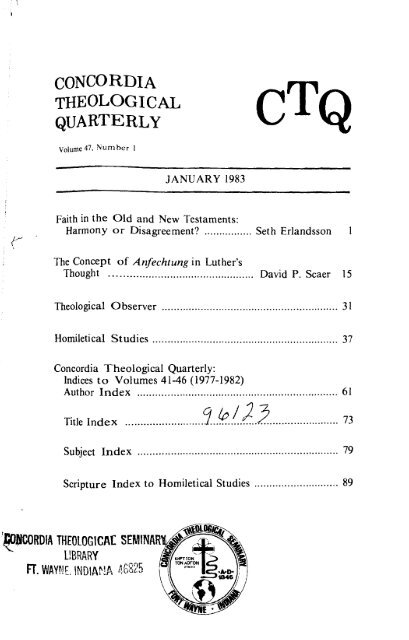
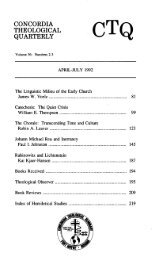
![VI nodaļa: CilvÄks â kas un kÄds viÅÅ¡ ir? [h]](https://img.yumpu.com/48350403/1/190x245/vi-nodaa-1-4-a-cilvaks-a-kas-un-kads-viaa-ir-h.jpg?quality=85)
